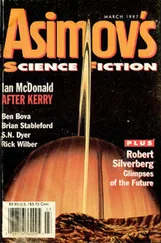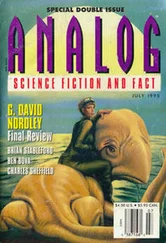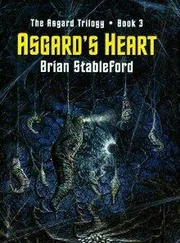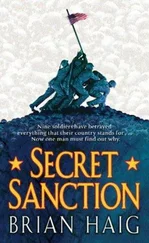Brian Stableford
Asgard’s Secret
For the Most Reverend LIONEL FANTHORPE, Primate Archbishop of the Interdenominational Templar Church of the Holy Lands and Good Friend
An earlier version of this story entitled Journey to the Center was published by DAW Books in 1982. A partly-revised edition was published in the UK by NEL in 1989. In the present version all the chapters that were unrevised in the NEL edition have been thoroughly rewritten, so none of the text of the original version has survived into this (much better) one, although the basic plot remains much the same.
If I had had more of a social conscience, events on Asgard might have developed very differently. In fact—or so I have been assured—the ultimate future of the human race might have been affected, perhaps for the worse, by my lack of charity. I find this a very sobering thought, and I’m sure that there’s a moral in it for us all. This isn’t my purpose in telling the story, however; I’m not in the business of writing moral fables.
Perhaps things would have been different if the call hadn’t come through in the middle of the night. No one is at his best when summoned from sleep at approximately 12.87 standard metric. I only had a wall phone in those days, which couldn’t be reached from the bed; to answer it I had to wriggle out of my sleeping bag and stagger across the room. I usually tripped over my boots en route. That’s why I habitually answered the phone with a grunt that sounded more like a curse than a greeting.
The voice that replied to my grunt didn’t seem in the least put out. He didn’t have his eye switched on, but his cultured voice immediately identified him as a Tetron. Pangalactic parole, being a Tetron invention, uses a range of phonemes that makes it difficult for anyone except a Tetron to speak it in a cultured tone, although the Chinese seem to manage much better than other humans. I speak three languages—English, French and Japanese—but in parole I still sound like the interstellar equivalent of a country bumpkin.
“Am I speaking to Michael Rousseau?” asked the Tetron.
“Probably,” I answered.
“Are you in doubt as to your identity?” he inquired solicitously.
“This is Mike Rousseau,” I assured him. “There’s no doubt about it. What do you want?”
“My code is 74-Scarion. I am the officer on duty at Immigration Control. There is a person desirous of entry to the city that identifies himself as a member of your species. I cannot admit him unless one of his own kind is willing to accept formal responsibility for his well-being, but he has no previous acquaintance with anyone on Asgard. As you know, your race has no consulate on this world, and there seem to be no official channels into which I can direct his request.”
“Why me?” I asked in a pained tone. “There must be at least two hundred humans on Asgard. How come your version of alphabetical order puts my name at the top of your list?”
“Your name was suggested to me by a Mr. Aleksandr Sovorov, who is a member of the Co-ordinated Research Establishment. I naturally approached him first, on the grounds that he is the one member of your species who is in a position of notional authority. He informed me that he is unable to accept responsibility for what he terms ‘scavengers and fortune-hunters’ and suggested that you would be more likely than he to have something in common with an individual of that sort.”
You will doubtless infer from this incident that I was by no means the only person on Asgard lacking in charity.
I groaned. “What, exactly, am I supposed to do for this character?” I asked.
“You would be required to provide him with accommodation until he can make arrangements of his own, and to familiarize him with the law and local customs. It is a temporary arrangement, until he is ready to make his own way—a matter of friendship and courtesy. Did no one perform the same function for you when you first arrived on Asgard?”
Actually, they hadn’t. Things had been less formalized in those days. There hadn’t been so many different species intent on getting a slice of the action—and the human race hadn’t been at war.
I cursed Aleksandr Sovorov for the malicious impulse that had prompted him to throw my name into the ring, and told myself that I didn’t have to knuckle under to that kind of whim, no matter how badly I needed his help. “I can’t do it,” I said, firmly. “I’m just about broke. I only came back to the city to stock up on supplies, and then I’ll be going out into the cold again. I can’t afford to take in any stray cats.”
“I do not understand,” said 74-Scarion, frostily. I’d had to use the English phrase “stray cats” because it couldn’t be translated into parole. If there were cats on the Tetron homeworld, I didn’t know how to describe them in parole, and it probably wouldn’t have done much good if I had. The Tetrax didn’t seem like the kind of folk who’d tolerate their pets going astray. They weren’t the kind of folk who approved of people casually dropping vernacular terms into their carefully crafted artificial languages either—they tended to view such actions as a kind of pollution, if not as flagrant insults.
“I can’t do it,” I repeated. “I probably don’t even speak his language. Unlike you, we have quite a lot.”
74-Scarion was unperturbed by this suggestion. A new voice chipped in, saying—in English—“My name is Myrlin, Mr. Rousseau—with a ‘y,’ not an ‘e.’ I also speak Russian and Chinese, if that would help to find me a sponsor. I wouldn’t want to force myself upon you, as you’re so clearly reluctant, but I wonder if you could suggest someone who might be willing to accept temporary responsibility for me. I really would like to get down to the surface tonight, if possible.”
He sounded so polite that I felt profoundly guilty—so guilty, in fact, that instead of following Aleksandr Sovorov’s example and trying to think of someone I disliked enough to book them an untimely wake-up call, I tried to think of someone who might be willing and able to take the poor guy in, if only to get him admitted to the city.
“I know someone who might be able to help,” I said, eventually—in parole, for the Tetron’s benefit. “I met Saul Lyndrach yesterday—he’s just back from a trip into the levels and he seemed quite pleased with the way things had gone. It’s bound to take him a while to trade his cargo, but his credit must be good, and he probably won’t be in any hurry to get back out again. He’s your man. He lives over in sector six. Give me a minute and I’ll look up his number.”
“That will not be necessary, Mr. Rousseau,” 74-Scarion assured me. “I shall obtain it from the central database. I am sorry to have troubled you. Thank you for your assistance.”
The minute he’d hung up, of course, I began to get curious. I’d been so eager to avoid getting the newcomer dumped on me that I hadn’t bothered to ask where he’d come from, or why, or any of a dozen other things I might routinely have asked of a fellow human being. Even if he hadn’t come from Earth, he was bound to have news, and I really should have been interested in news, given that there was a war on. Even if there hadn’t been, it would have been pleasant to see a new human face. When there are only a couple of hundred members of one’s own species in a city whose population runs into the tens of thousands, on a world thousands of light-years from Earth, it’s worth making an effort to be friendly. Aleksandr Sovorov might be the kind of person who took pride in looking down on his own species, but I wasn’t, and I regretted having given the mysterious Myrlin the impression that I might be.
Читать дальше












